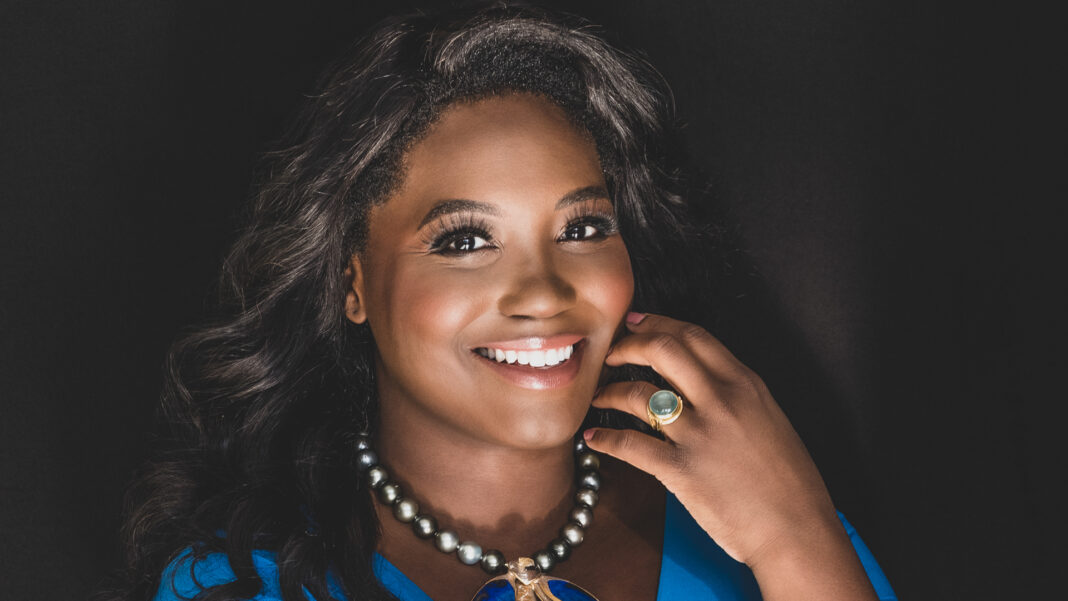If you’ve either attended productions of Porgy and Bess or Fire Shut Up in My Bones at the Metropolitan Opera (or seen the Live in HD screenings of those works) you are familiar with soprano Angel Blue. She’s performed many of the great soprano roles in opera houses around the world, including Bess in Gershwin’s opera and a trio of roles in Terence Blanchard’s.
But her story begins in California. She was raised here and went to UCLA. Her education was financed by entering and winning several beauty pageants. Blue won the titles of Miss Hollywood in 2005 and Miss Southern California in 2006. She spent three years in the Domingo-Colburn-Stein Young Artist Program at LA Opera. From there the world welcomed her with rave reviews and this year Blue was named the winner of the Richard Tucker Award.
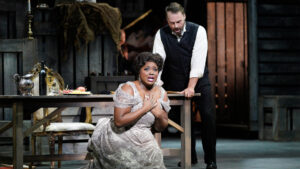
She is back in Southern California as the lead in the LA Opera production of Puccini’s Tosca. She appears with tenor Michael Fabiano (through December 4th) and Gregory Kunde (December 7th – 10th) as Tosca’s lover, Cavaradossi. Ryan McKinny sings Scarpia. This John Caird production, first seen in Houston in 2010, made its debut at LA opera in 2013.
Last week, after the dress rehearsal for Tosca, I spoke with Blue who was at the Dorothy Chandler Pavilion. She was being followed around by a documentary film crew from Germany.
Our conversation took place via Zoom. What follows are excerpts from that conversation that have been edited for length and clarity. To see the full interview, please go to our YouTube channel.
Before we talk all things Tosca, I want to congratulate you on this week’s Grammy nomination for Fire Shut Up in My Bones.
Thank you.
I saw the opera through Live in HD and found it incredibly powerful and incredibly moving. What made that opera special for you?
I think for me it was the historical aspect of it. It was the first time that the Metropolitan Opera had done an opera written by a Black composer [Terence Blanchard]. Of course, coming back after COVID and having the opera be shut down for a whole year like that, I think all of those historical moments made it what it was for me. I just felt very blessed to be a part of it because it was such a moving moment in time for me.
And a moving one for the audience as well. What challenges did composer Terence Blanchard give you that you feel are unique to the way he writes opera?
I think the biggest challenge for me was that on the first day of rehearsal he told all of us, “You guys are classical musicians, so I know that you’re going to do what is on the page, how it’s written.” And he said, “I want you to do what is on the page. But I also want you to go back to your roots.”
When he said that I thought about my dad and how I grew up. I did grow up singing opera and listening to classical music. But I also grew up in church, playing the bass guitar and listening to gospel, singing gospel, hearing my father sing gospel, having my father sing classical music as well.
He made basically a blueprint for all of us to follow. Then within that blueprint, he said, I want you to kind of come out of the confines of the blueprint and make it your own by being able to sing something like Peculiar Grace with more of an R&B gospel style. [That] was something that I never get to do in an opera. So it was a challenge in that we wanted to honor what Terence had written, but we also wanted to bring in our roots. So it was definitely a challenge to be able to put the two together, to give myself the freedom to do that in an opera on a stage like the Met. It was awesome.
Now let’s talk Tosca. If my research is correct, this production in Los Angeles is only the second time you’ve sung Tosca. Part of that was because you had two different productions canceled during the pandemic that you were scheduled to do. So after the disappointment that I’m assuming comes along with those cancelations, what does finally being able to revisit this role mean to you now?
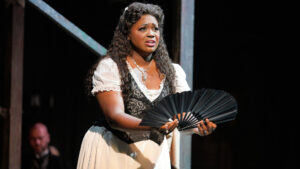
First I want to say I wasn’t disappointed. I wasn’t. To be honest with you I felt like, and I still feel, that when something like what happened with COVID and all of those cancellations, what that afforded me was not just a break, but it also afforded me the time to sit back and think. Maybe this is not the right time to be singing these pieces back-to-back like that in one season. So I wasn’t so disappointed with it because I’m happy with how it is now. I have this production and then I do it again next summer.
I don’t believe in coincidences, so I think that was perfect. This production is very, very traditional. It’s so helpful to sing Tosca in such a way that allows for me to actually really invest in who the character is and really, I think, become Tosca.
The first production you did would not be defined by anybody as a traditional production. Does this almost feels like this is your first, I don’t want to say conventional, but traditional Tosca anyway?
This is definitely my first conventional Tosca – you’re fine to say that it is. I’m happy to do it. For me the music has always had the same meaning. The singing has always been the same in terms of the challenges. It’s all the same music. Being able to express it in this way is something that I’m very thankful for. It’s a special time and it is the right time – that’s more important.
What makes it the right time?
It’s just kind of like with COVID; if it wasn’t supposed to happen, it wouldn’t have. It’s the right time and everything is right. I’m at the right age for it. I feel right in my body about it. I’m back in Los Angeles where it couldn’t possibly be more comfortable to be singing this role. This is a role that comes with a lot of, for lack of a better word, a lot of stress. You have to be vocally prepared and ready, also dramatically prepared and ready. As my band Radiohead says, everything is in its right place.
If the schedule had happened as it was planned to this would be your fourth Tosca instead of your second. Is your approach to this opera any different today than it might have been had that schedule actually played out as as originally scheduled?
I think if it was my fourth Tosca production, I think maybe I would have been honestly less excited. I’m just being honest. I probably would have been less excited. Not less excited because of the opera or what have you. For example, I’ve done eight productions, I think, now of La Traviata and it’s not that I’m not excited by the opera. But at some point the artist grows out of something and you grow into something else.
I see myself having the opportunity to really grow into Tosca. The journey is really just starting and that’s good because it’s the right time for it to start. And I hope it’s the beginning of a very wonderful run of Toscas for years to come.
Let me ask you about that 2019 production in Provence that you did – the Christophe Honoré production. There was a new character introduced and you were wearing a hoodie. Not how I normally look at Tosca, but to each his own. What did you learn from that first experience that is informing what you’re doing as a singer, as an actor, in this one?
Flexibility. We have to be flexible as opera singers. It’s important to be able to sing, of course, that’s what our job is. What I really loved about Christophe was that his imagination was just all over the place. It was wild and it was everywhere. And what I loved about it was that he wanted us to go on that wonderful journey with him. Because of that I had to know the music really, really well. What I was saying and what I was singing did not go along with the dramaturgy. It didn’t go along with the staging. So I had to make sure that I knew my music well.
Then on top of that I had to take my imagination to another level of my Tosca being this student, learning from the prima donna who was played by Catherine Malfitano. So I enjoyed it because it stretched my imagination and it made me realize that I’m an opera singer. But I feel like I’m so much more than that because of that production and hopefully the flexibility and the the open-mindedness that I had to learn doing that production. I hope I bring that into this production, even though it is traditional.
I looked at an interview that John Caird gave to the Los Angeles Times when this production was first performed at LA Opera. Caird said something that I thought was really interesting: that the opera could have benefited from a second female character. He then went on to say, “There are things that are not terribly well done, but you can’t worry too much about the infelicities and the dramaturgy. The music sorts out all the problems.” Do you agree with John Caird? Do you think that it’s a rocky dramaturgical piece of work, but that Puccini’s music compensates for that?
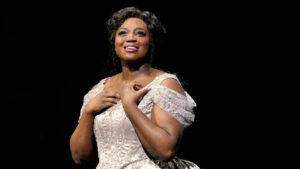
I’m very fortunate because I have sung the opera with another soprano and not just any soprano, she’s a legendary Tosca. Who knows if sopranos really want to share the role of Tosca. But I think there would be something if there was another protagonist maybe in the show. But Puccini’s heart, everything about this man, every ounce of his being, comes out in the music. I don’t want to say it like this, but I don’t know how else to say it. Perhaps the drama doesn’t fail. Maybe that’s not the right word. But I’ll say this. The music is constantly going. It doesn’t ever really stop. So I’ll say that when the drama sort of slows down, that’s when the music kind of kicks in and keeps it going. So I would agree with him.
In 2019 you did an interview with with Gramilano and you mentioned that Violetta and Tosca were your favorite characters, your favorite roles and that Don Giovanni and Tosca were your favorite operas to watch. From a spectator’s point of view and being in your shoes, what makes Tosca so special for you to watch?
I enjoy the drama. I enjoy the brass. I love the brass section of the orchestra. Actually I should have said my favorite opera is Turandot. I love the brass section. Puccini, Strauss, Wagner, they use the brass section like none other. And Terence Blanchard, too! I know that because I had to sing with them.
But I love the way he writes for the orchestra in Tosca. The singers just being able to, if I may say it this way, accommodate what he’s written. You can actually listen to the whole opera of Tosca – just the orchestra. Take out everything else: take out the voices, all of it, the choir, and you can listen to it and I imagine it would play the same. That’s why I said we’re there to accommodate. We’re there to almost, in a way, backup the orchestra. Maybe I’ve always felt that way about Tosca. I don’t know how correct that is to say as a singer, but that is my impression of the opera.
I think for any soprano the shadow of Maria Callas is is unavoidable. In 2021, BBC’s music magazine, Classical Music, named Callas’s 1953 recording of Tosca as the finest recording ever. How long is her shadow and at what point do you think you and other sopranos are not going to have to face the the Callas of it all?
I can only say that I greatly admire her dedication, diligence and devotion to her craft. If it happens that she is the quintessential Tosca for the rest of humanity, then so be it. I’m happy to say that I’ve lived in her shadow. I don’t mind that. I can only say that I’m grateful that I’ve been able to sing the same music that she sings. I was singing, of course, with my voice and with my heart and my experience.
Tosca is one of the greatest opera roles ever. From my perspective any woman who can put herself into Tosca’s shoes, make it through the whole evening and come off stage with their head held high – you’ve done a great thing, regardless of who has the finest recording. In the moment that I’m singing Tosca and whoever else is singing Tosca, that’s our moment. And we honor Maria Callas. We thank her. I honor her and I thank her for the role that she’s played for us sopranos. But if it’s a shadow, I’ll stand in it.
I’m going to finish by asking you about something that Callas is quoted as having said. She said, “An opera begins long before the curtain goes up and ends long after it has come down. It starts in my imagination. It becomes my life and stays part of my life long after I’ve left the opera house.” Do you feel similarly to Maria Callas?
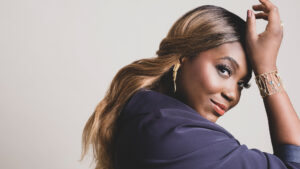
I was a young artist here at Los Angeles Opera 15, 16 years ago. Going from being a young artist to singing such a role where I was a young artist – I’m where I want to be. I don’t know if I can, honestly say, “Oh, I have this great dream to sing Tosca here or there or wherever.” I just know that I’m grateful to sing it here.
I agree with her in that the opera starts way before the curtain goes up, because we have to be thinking about it all of the time. I’m constantly working on the music. I’m constantly studying and that will never change. I will be studying until, you know, God takes me out of here.
But I differ from from Ms. Callas in that the opera does stop, because it can’t be my whole life. I have a family. I have a husband. I have a stepson. I have people in my life. That curtain must go down so that I can be Angel. I’m not always Angel Blue singing.
As soon as we’re done with this Zoom and I leave this opera house, I’m going to go eat. I’m going to do my thing. And the curtain will definitely be down. It’ll be down good, too, you know? And it doesn’t come back up until I have to come back and do my job, if that makes sense. But I’m thankful for Tosca. It’s brought me back home. Literally all I can think about is that I’m home.
To see the full interview with Angel Blue, please go here.
Main Photo: Angel Blue (Photo by Dario Acosta/Courtesy Askonas Holt)










